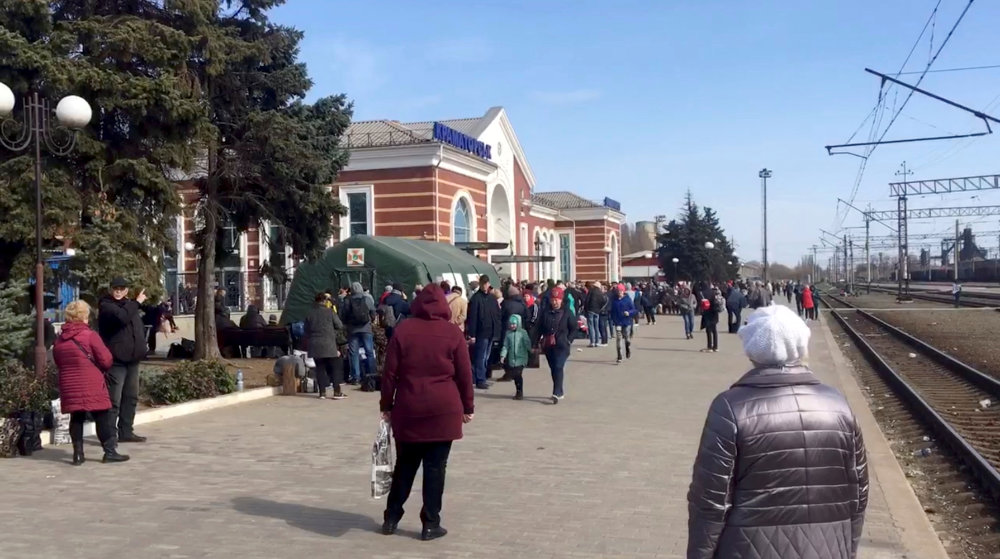KRAMATORSK, Ukraine: Evacuations resumed on Saturday from Kramatorsk, in eastern Ukraine, where a missile strike killed 52 people at a railway station, as British Prime Minister Boris Johnson became the latest Western leader to visit Kyiv.
Hailing the country’s response to the Russian invasion, Johnson offered Ukraine armored vehicles and anti-ship missiles to help ensure, he said, that the country will “never be invaded again.”
Because of the “invincible heroism and courage” of President Volodymyr Zelensky and the Ukrainian people, Russia’s “monstrous aims are being thwarted,” he said.
A video released by Zelensky’s office showed him and Johnson walking through largely empty city streets to Kyiv’s historic Maidan Square, as snipers kept watch.
The two men greeted passersby, and one visibly emotional man called out to Johnson, “We need you.”
Johnson, who a day earlier pledged to send Ukraine weaponry including Starstreak anti-aircraft missiles and 800 anti-tank missiles, added that the discovery of scores of civilian bodies in Ukrainian towns had “permanently polluted” Russian President Vladimir Putin’s reputation.
Six weeks into Russia’s invasion, Moscow has shifted its focus to eastern and southern Ukraine after stiff resistance thwarted plans to swiftly capture Kyiv.
With thousands killed in fighting and more than 11 million fleeing their homes or the country, the Ukrainian president called on the West to follow Britain’s example on military aid.
“We need even more sanctions” against Russia, Zelensky said in a video address Saturday evening. “We need more weapons for our state.”
EU leaders were meeting with Zelensky in Kyiv on Friday as news emerged of the devastating attack on Kramatorsk’s station. The 52 victims included five children.
US President Joe Biden accused Russia of being behind a “horrific atrocity” in Kramatorsk, and France condemned the strike as a “crime against humanity.”
Moscow denied responsibility for the rocket attack, which also wounded 109 people, according to the latest official count.
As Russian forces regroup in the east and south of Ukraine, local officials are urging residents to flee before it is too late.
On Saturday, the mayor of eastern Lysychansk, Oleksandr Zaika, called on residents to evacuate as soon as possible due to constant shelling by the Russian army.
“It has become very difficult in the city, enemy shells are already flying,” Zaika said in a video message. While the city had stocks of humanitarian aid, he added, “that doesn’t mean it will save your life if an enemy shell arrives.”
And more Russian shells did arrive on Saturday, killing five people in the eastern cities of Vugledar and Novo Mikhaylovka, local governor Pavlo Kyrylenko said on Telegram.
Meanwhile, in Kramatorsk minibuses assembled at a church to collect shaken evacuees. Almost 80 people, most of them elderly, sheltered in a building near the targeted station.
“There were around 300 to 400 people who rushed here after the strike,” Yevgeny, a member of the Protestant church, told AFP.
“They were traumatized. Half of them ran to shelter in the cellar, others wanted to leave as soon as possible. Some were evacuated by bus” on Friday.
The Kramatorsk station was serving as the main evacuation hub for refugees from parts of the eastern Donbas region still under Ukrainian control.
AFP reporters at the station saw the remains of a missile tagged in white paint with the words “for our children” in Russian — an expression used by pro-Russian separatists to invoke their own losses since fighting in Donbas began in 2014.
The governor of Donetsk claimed a missile with cluster munitions — banned by an international treaty — was used in the attack, according to remarks published by the Interfax news agency.
Speaking Saturday from Warsaw, European Commission President Ursula von der Leyen said a global pledging event for Ukrainian refugees has raised 10.1 billion euros ($11 billion).
In another sign of Western solidarity, Austrian Chancellor Karl Nehammer also visited Kyiv and the nearby town of Bucha on Saturday.
Bucha — where authorities say hundreds were killed, some with their hands bound — has become a byword for the brutality allegedly inflicted under Russian occupation. And Ukrainian officials say they are uncovering even greater devastation in nearby towns.
In a joint news conference with the Austrian leader, Zelensky said Ukraine was “still ready” to continue negotiations with Moscow — talks stalled by the killings in Bucha and elsewhere.
Ukraine said Saturday it had completed a third prisoner exchange with Russia, bringing 12 soldiers and 14 civilians home.
Russian troops appear intent on creating a long-sought land link between occupied Crimea and the Moscow-backed separatist territories of Donetsk and Lugansk in the Donbas region.
Moscow said Russian troops had fired on a Ukrainian vessel trying to evacuate commanders of the Azov battalion from the besieged southeastern city of Mariupol.
The Azov Special Operations Detachment has been fighting Russian forces in Mariupol — scene of some of the war’s most grievous civilian suffering — as it lies between Russia-occupied Crimea and pro-Russian separatist regions in Ukraine’s east.
Moscow’s defense ministry, underscoring Russian advances, said its forces had destroyed an ammunition depot in the Dnipro region and struck 85 Ukrainian military targets in the previous 24 hours.
Fresh allegations also emerged from Obukhovychi, northwest of Kyiv, where villagers told AFP they were used as human shields.
Moscow has denied targeting civilians, but growing evidence of atrocities has galvanized Ukraine’s allies in the EU, which has approved an embargo on Russian coal and the closure of its ports to Russian vessels.
The bloc has frozen 30 billion euros ($33 billion) in assets from blacklisted Russian and Belarusian individuals and companies, it said Friday.
It also blacklisted Putin’s two adult daughters — not long after the US and Britain did the same — as part of its latest sanctions package, according to an official list.
As sanctions bite, credit rating agency Standard and Poor’s Global Ratings downgraded Russia’s foreign currency payments rating to “selective default” after Moscow paid a dollar-denominated debt in rubles this week.
Civilians flee eastern Ukraine after deadly railway station attack




